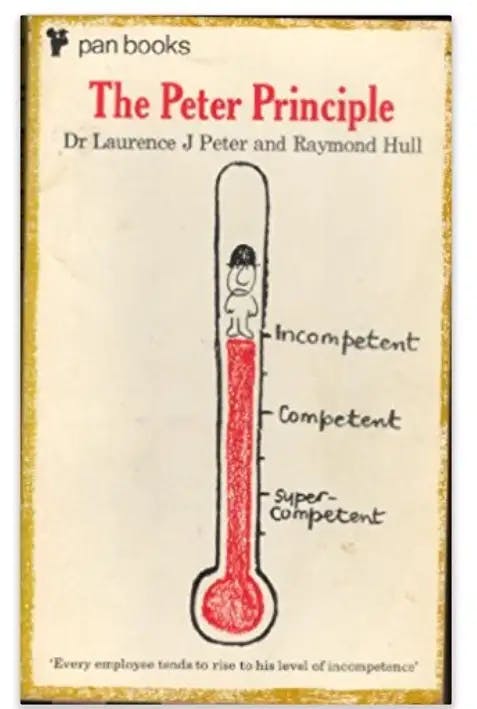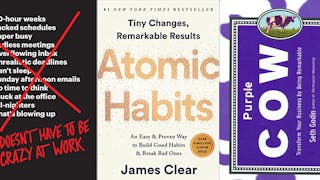The Peter Principle
By Laurence J. Peter and Raymond Hull. Book Review
In a hierarchy every employee tends to rise to his level of incompetence

The Peter principle was written in 1969 yet still is very much valid. It might sound harsh on some, as it attacks our perception of “9 to 5” jobs, career paths, full time employment and promotion. I hope you all read it, and learn something from it. The book is fairly short (150 pages).
Book quotes
In a hierarchy every employee tends to rise to his level of incompetence
Here is an example to elaborate: an exceptional teacher would be considered time and again for promotion, and he keeps performing well as long as he is promoted into something he is good at. Like teaching. But when he is finally promoted into an executive manager, he under-performs. So much that he is never considered for another promotion. Year after year, that once-exceptional teacher, is stuck as an incompetent executive manager.
Incompetence knows no barriers of time or place
In defense, the author states it is not “the old, contemporary, and out of date” that is incompetent, nor it being the “original state of the art” is competent. Incompetence knows no barriers of time or place. You sell your best product as long as you do your best in producing it. When your product line increases, and more incompetence is introduced to it, it stops selling. And you’re stuck at that level.
You have heard the nurse who says, ‘wake up! It’s time to take your sleeping pill.’
The Peter Inverts as he calls them, are those who always obey, and never decide. Those are perfect for the system, and they are eligible for promotion, even though the paperwork they cherish so much stopped serving the purpose they were designed for. But when this already-incompetent official is finally promoted into a spot where he has to make the shots, he finds his level of incompetence. And like a waterfall, the drag in making decisions takes on all lower levels, creating bank officials who won’t cash travelers checks, customer service who won’t answer a finance related question, and nurses who would wake you up for your sleeping pills, for no other reason than “it’s regulations!”
Competence, like truth, beauty and contact lenses, is in the eye of the beholder.
True. Some examples are to prove that what we see as “competent” in the eyes of the system, is really totally incompetent.
These cases illustrate the fact that, in most hierarchies, super competence is more objectionable than incompetence.
This is a very important section in the book. The first commandment in a hierarchical life: the hierarchy must be preserved. Thus incompetency is a bar to promotion, super competency disrupts the hierarchy, it proves it wrong, it shows people a better and more efficient way to get things done faster, it is a cause of dismissal! In today’s terms: over qualification won’t get you the job, but under performing would get you stuck at one level!
It is very sad! Note that this book was written in late ’60s, where hierarchy was much more honored than today. Nowadays, there are more small businesses and freelancers coming to life, breaking free of the hierarchy, proving it is not the way to go. But for those who are stuck with it, it is a reminder, that if you get fired, it could be because you are overqualified!
Never stand when you can sit, never walk when you can ride, never Push when you can Pull.
Referring to the Push and Pull techniques in acquiring a promotion. Not sure how the subject got turned into that, but mainly the author exhibits that pushing yourself into acquiring higher level and a better position is usually the wrong way to go. It is more tedious and exhaustive. Pulling is about finding patronage, or building relationship with the one higher up in rank, who can “pull” you up the scale. This -according to him- is what has been proven to work more often than pushing. So never push when you can pull. Unless you are on a diet and want to lose some weight!
If at first you don’t succeed, try something else.
As opposed to the well-known saying: If at first you don’t succeed, try, try again. Why do people still repeat that stupid saying? This book was written some decades ago, and I could trace the same belief in most start-up entrepreneurs and large corporates. If you try to do something and it does not work, do not hesitate to change, adapt, and try something different. Beating a dead horse is not going to bring it alive. Be flexible. Move on.
In “First, break all the rules” book, the author states that a talent, is doing the same practice over and over again, without feeling exhausted, or degrading in excellence. What you are talented in, never dictates what you should do. But if you do get exhausted doing something (and become incompetent), that is a sign for you that you never had the talent to do it.
Sooner or later (usually sooner) these employees become aware of, and feel distressed at, their own unproductivity.
Did you ever feel that way? You have reached your level of incompetence, and it is time for you to take a step. The authors describe more evident physical signs of distress, like headaches, muscle spasms, insomnia, dizziness, ulcers, fatigue, and the whole list of medical leave excuses.
Good advice is equally ineffective.
‘take it easy.’
‘Don’t work so hard.’
‘Learn to relax.’
Such soothing suggestions are useless.
These are some of the pieces of advice someone with physical alarming signs receive. It does not work because employees are in fatigue because of how little use they make of their time. Asking them to make even less use of it won’t fix it.
The only treatment, my survey shows, which gives any relief to the FPS is distraction therapy.
‘Learn to play bridge.’
‘Start a stamp collection.’
‘Taking up gardening.’
‘learn barbecue cookery.’
‘paint pictures by numbers.’
FPS is Final Placement Syndrome as authors would like to call it, which refers to the physical symptoms that accompany reaching your incompetence level. So what employees tend to do is drive their attention away from the loathing job they have. To me though, doing Jigsaw puzzles is more of a distraction treatment, when my Lizard brain kicks in.
General purpose conversation, or, in the case of public figures, general purpose speeches.
That’s what we call jargon. So if your colleague increases the dose of those jargon words, he/she needs help. If you get any of those symptoms yourself, you need help.
He assumes that he is not working hard enough, so he feels guilty.
Someone who now knows he or she has reached their final placement, may argue that it’s about laziness, which intensifies the feeling of guilt. So he works harder to convince himself that it just needs time, he drivers himself to the limit, and … here it is said 4 decades ago: takes work home on weekends! If that is you my dear employee friend, you either quit, or ignore. Ignorance is a bliss.
Personally, I do reach that point towards the end of any freelance project, that’s when I start to feel inept, and completely useless. My warning signs, just as the authors predicted, so much false fatigue to the point of producing zero work in a day. That’s when I know, my time to move on has come.
The blunt refusal of an offered promotion is known as Peter’s Parry. To be sure, it sounds easy enough. Yet I have discovered only one instance of its successful use.
He gives an example of some accountant who apparently deliberately loses paperwork, to prevent his superiors from promoting him into a position he knew he would not be as competent. I have pulled that trick quite a few times in my career. Seems like “I need to move on” is not good enough to some of those I worked with, slipping on few deadlines (not enough to smudge my reputation) sometimes did the trick. But it isn’t easy. And it does take insights to refuse a promotion. Know yourself.
The computer, like a human employee, is subject to the Peter Principle. If it does good work at first, there is a strong tendency to promote it to more responsible tasks, until it reaches its level of incompetence.
So now that we expect our computers to do more, they become incompetent. Makes sense.
Conclusion
It has been my decision a long time ago to disassociate myself of the career hierarchy and follow my own path. I don't quite know what tipped me back then, but I know now as I understand more about myself, that it was all a decision to perfect. I am reviewing this book as I am ending a phase of current long term project, and I could immediately relate to a lot of what I am reading.
My one advice to give to all people reading these books (and all the books I reviewed and about to review), is know yourself. Most of the value I add into any project is during inception, I know by the time they become more mature I would have less value to add. Not because of the type of work I do, but rather because of who I really am. I have learnt to quit when my value was about to deteriorate. Right before I became a burden, and a drag on the project. There was no point in taking it further, that would have only worsened by reputation. And it would have meant I should stick around long enough to fix the trail of problems I would create. In other words, be stuck at my level of incompetence.
Not a chance.
I give this gem a 5 out of 5.















